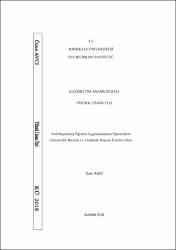Farklılaştırılmış öğretim uygulamalarının öğrencilerin girişimcilik becerisi ve akademik başarısı üzerine etkisi
Özet
Yapılandırmacı yaklaşımla birlikte temelde öğrencilerin ilgi çeşitliliğine ve bireysel farklılıklarına göre tasarlanan farklılaştırılmış öğretimin, öğrenme sürecine önemli katkılar sağlayacağı ön görülmektedir. Çalışma, farklılaştırılmış öğretim tasarımını merkeze alarak, bu tasarımın öğrencilerin girişimcilik becerileri ve akademik başarısı üzerindeki etkisini belirlemeyi amaçlamıştır. Bu amaçla 6. sınıf fen bilimleri dersi programından seçilen elektriğin iletimi ünitesi girişimcilik becerisi temelinde, girişler noktası, istasyon, merkezler, ajanda ve kademelendirilmiş öğretim tekniği çerçevesinde farklılaştırılmıştır. Araştırmada ön test-son test yarı deney desen kullanılmış olup deney grubu İstanbul İlinde bulunan bir ortaokulda 6. sınıfa devam eden 29 deney grubu ve 28 kontrol grubundaki toplam 57 öğrenciden oluşmuştur. Çalışmada, sırasıyla Çelik, Bacanak ve Çakır (2015) ile Gürbüz (2012) tarafından hazırlanan girişimcilik ölçeği ve akademik başarı testi, uygulamadan önce ve sonra olmak üzere iki defa deney grubuna uygulanmıştır. Verilerin analizinde bağımlı ve bağımsız T-Testi kullanılmıştır. Araştırmanın bulgularına göre deney grubuna uygulanan farklılaştırılmış programın, öğrencilerin akademik başarı ve girişimcilik becerilerini anlamlı derecede arttırdığı gözlenmiştir. It is envisaged that differentiated teaching, which is designed according to the diversity and individual differences of the students, will contribute significantly to the learning process. The study seeks to centralize differentiated instructional design and to determine the effect of this design on the entrepreneurial skills and academic achievement of the students. For this purpose, the electrical conduction unit selected from the 6th grade science course program is differentiated on the basis of entrepreneurial skills, in the framework of entry points, stations, centres, agenda and graduated teaching technique. In the study, pre-test-post-test quasi-experimental design was used and the experimental group consisted of 57 students (28 control and 29 experimental groups) continuing to 6th grade in secondary school in İstanbul province. The entrepreneurship scale and the academic achievement test prepared by Çelik, Bacanak and Çakır (2015) and Gürbüz (2012), were applied to the experimental group twice before and after the application. Paired and Independent Samples T-Test was used for the analysis of the data. According to the findings of the research, it was observed that the differentiated program applied to the experimental group increased students' academic achievement and entrepreneurial skills significantly. According to the findings obtained, suggestions were made to researchers and practitioners.
















